Literary rating: ★★★
Kick-butt quotient: ☆☆½
“Kiner and I have fought many battles together. All of us knights have seen our closest friends cut down in front of us. Some of us have seen family killed before our eyes. Even the most battle-hardened soldier can lose their minds when the blood flows. Always concentrate on staying alive. Focus on your target. Mourn your friends later. Honor them by staying alive.”
 The half-elven Lady Bethany has shattered the glass ceiling for women in the military forces, rising to third in command, a position she has achieved on her own merit. Of course, it probably didn’t hurt that she is daughter of the goddess Apaxia, although her ancestry causes as many problems as it solves. This is due partly to some pesky secret prophecies which outline – in typically vague prophetic ways, with references to the “Diamond” and the “Viper” – Bethany’s very important place in future events, and partly her estranged twin sister, Sarissa. For she has turned to the dark side of magic, insanely jealous of her sister’s success, with the emphasis squarely on “insanely” there…
The half-elven Lady Bethany has shattered the glass ceiling for women in the military forces, rising to third in command, a position she has achieved on her own merit. Of course, it probably didn’t hurt that she is daughter of the goddess Apaxia, although her ancestry causes as many problems as it solves. This is due partly to some pesky secret prophecies which outline – in typically vague prophetic ways, with references to the “Diamond” and the “Viper” – Bethany’s very important place in future events, and partly her estranged twin sister, Sarissa. For she has turned to the dark side of magic, insanely jealous of her sister’s success, with the emphasis squarely on “insanely” there…
Meanwhile, Bethany feels a strange attraction to one of the new soldiers she is supposed to be training, the human Arrago, who seems to have a role to fulfill in prophecy as well. Yet what will happen when he finds out about Bethany’s divine origins? This makes for a solid enough bit of fantasy, though I am not certain it stands up to scrutiny. For instance, it’s well into the book before we discover Bethany actually had another sister, Drea, one who was not quite so gloriously barking mad. This was a “Wait, what?” moment, and something you think might have been mentioned when discussing her twin.
The other demerit is for Sarissa. Not that she’s a bad villainess. Quite the contrary: she’s so good at being bad, she’s an amazing scene-stealer. I’d rather have read more about her…ah, interesting world-view, rather than the Bethany-Arrago romance, which never manages to be convincing [I’ve always felt any human/elven romance is going to be on shaky ground, due to the difference in lifespans]. At the risk of treading on spoilers, it’s a real shame it turns out Sarissa isn’t quite the big bad she’s initially painted. That’s a pity, and significantly decreases the odds of me going back for subsequent volumes.
What I did like was Bethany’s interactions with colleagues such as fellow lords Jovan and Kiner: there’s a familiarity in these which rings true (and a crudeness to their humour which is not quite what I’ve experienced from fantasy elves). I just wish we’d been given more evidence of the heroine’s skills. It’s well past the half-way point before we see anything more than the literary equivalent of training montages. When they show up, they’re undeniably impressive – even before she has tapped into her full, literally god-given “power” – and I’d love to see a feature version of this, with Gwendoline Christie playing both sisters. But I do have to wonder how the long, red-haired Bethany mutated into the woman shown on the cover…
Author: Krista D. Ball
Publisher: Amazon Digital Services, available through Amazon, both as an e-book and a paperback
a.k.a. Tranqulity’s Blaze
Book 1 of 5 in the Tranqulity series.





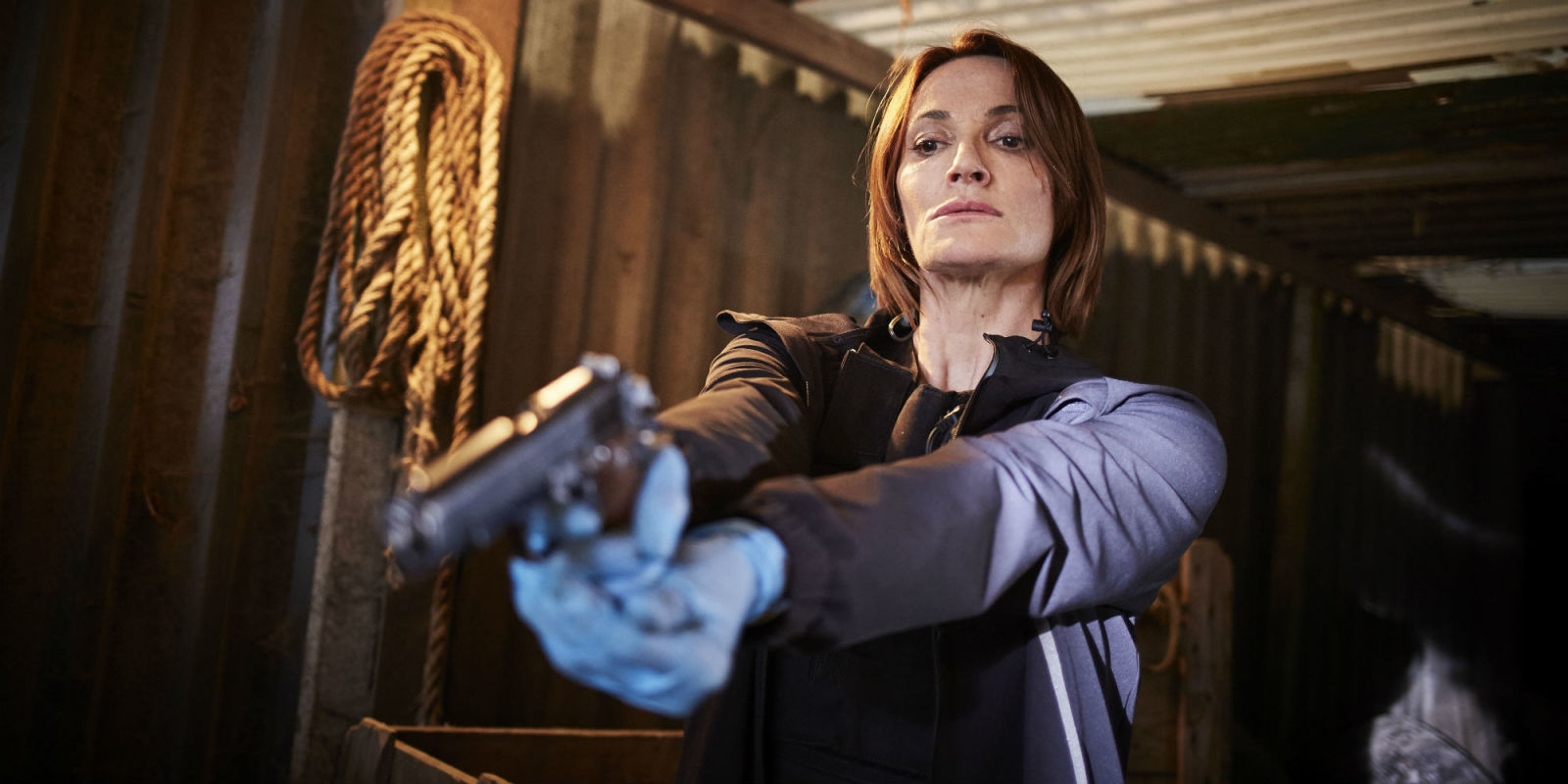 ★★★½
★★★½ Three millennia previously, the Terrans landed on the planet of Ogun, and took it over. The native Iliri, though in many ways superior to the new arrivals in both mental and physical ability, ended up subjugated. They are now very definitely second-class citizens, only remembering vague legends of their once-proud past. One such is Salryc Luxx, a rare pure-bred Iliri who is a private in the army. Despite the fierce prejudice against “her kind”, she gets a try-out for the Black Blades, the military’s elite special forces. Which, it turns out, is a haven for Iliri and their supporters. Sal becomes the first woman in the unit, and her talents – including the ability to shape shift – quickly become an essential part of the team, allowing her to become one of their top covert assassins. However, her presence also causes significant static, not least her relationship with the Black Blades’ commanding officer, Blaec.
Three millennia previously, the Terrans landed on the planet of Ogun, and took it over. The native Iliri, though in many ways superior to the new arrivals in both mental and physical ability, ended up subjugated. They are now very definitely second-class citizens, only remembering vague legends of their once-proud past. One such is Salryc Luxx, a rare pure-bred Iliri who is a private in the army. Despite the fierce prejudice against “her kind”, she gets a try-out for the Black Blades, the military’s elite special forces. Which, it turns out, is a haven for Iliri and their supporters. Sal becomes the first woman in the unit, and her talents – including the ability to shape shift – quickly become an essential part of the team, allowing her to become one of their top covert assassins. However, her presence also causes significant static, not least her relationship with the Black Blades’ commanding officer, Blaec.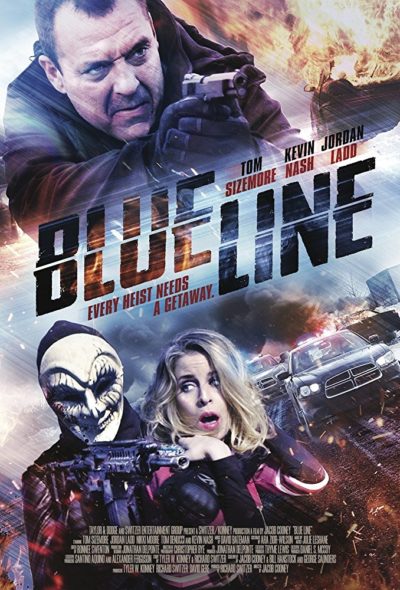 Small world. Well, small-ish. I used to work for the same online media company as one of the scriptwriters of this, though our paths there never crossed in any meaningful sense. That’s probably about as interesting a factoid i.e. “not very”, as this film. Indeed, outside of some gratuitous strip-club breasts, it feels like it could have strayed in from a slow weekend on Hallmark. Battered wife Lindsay (Ladd) teams up with longtime stripper friend Nicole (Moore), and commit a string of armed robberies around their local area in Connecticut, their identities hidden with Halloween masks and voice-changers. They’re building up towards a big score, which will involve relieving Lindsay’s abusive husband, Seth (DeNucci) of a crisp $1.8 million dollars in cash. But increasingly, sniffing around the robberies is Detective Broza (Sizemore), a city cop who has recently been transferred to the town: Nicole starts a relationship with him, ostensibly to see how the investigation is going. But is that her real motive?
Small world. Well, small-ish. I used to work for the same online media company as one of the scriptwriters of this, though our paths there never crossed in any meaningful sense. That’s probably about as interesting a factoid i.e. “not very”, as this film. Indeed, outside of some gratuitous strip-club breasts, it feels like it could have strayed in from a slow weekend on Hallmark. Battered wife Lindsay (Ladd) teams up with longtime stripper friend Nicole (Moore), and commit a string of armed robberies around their local area in Connecticut, their identities hidden with Halloween masks and voice-changers. They’re building up towards a big score, which will involve relieving Lindsay’s abusive husband, Seth (DeNucci) of a crisp $1.8 million dollars in cash. But increasingly, sniffing around the robberies is Detective Broza (Sizemore), a city cop who has recently been transferred to the town: Nicole starts a relationship with him, ostensibly to see how the investigation is going. But is that her real motive?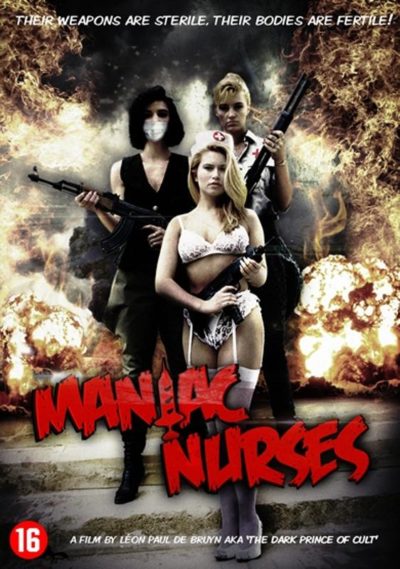 That this Belgian flick starts off with a dedication to Ilona Staller (a.k.a. Italian porn star, Cicciolina), artist provocateur Jeff Koons, and Traci Lorde, likely tells you it should not be taken too seriously. Certainly, the amusement to be found largely requires the viewer to be aware of the genres to which this is a homage. This is best exemplified by the
That this Belgian flick starts off with a dedication to Ilona Staller (a.k.a. Italian porn star, Cicciolina), artist provocateur Jeff Koons, and Traci Lorde, likely tells you it should not be taken too seriously. Certainly, the amusement to be found largely requires the viewer to be aware of the genres to which this is a homage. This is best exemplified by the  The above line of dialogue is a perfect litmus test for what you’ll think of this. If your reaction is a derisive snort, this pair of hour-long items – I have qualms about calling them anything as high-minded as “feature films” – is probably not for you. And I cheerfully admit, snorting is probably the default, and understandable, reaction. If, on the other hand, you are giddy with anticipation at the very thought, then I probably cannot recommend it highly enough.
The above line of dialogue is a perfect litmus test for what you’ll think of this. If your reaction is a derisive snort, this pair of hour-long items – I have qualms about calling them anything as high-minded as “feature films” – is probably not for you. And I cheerfully admit, snorting is probably the default, and understandable, reaction. If, on the other hand, you are giddy with anticipation at the very thought, then I probably cannot recommend it highly enough. In the film’s defense, it’s not clear quite how post-apocalyptic this is meant to be, since we don’t see anything of the world at large. Everything takes place inside a stretch of desert which has been used, apparently for some time, as a dumping ground for the dregs of society. Into this environment is dropped Arlen (Waterhouse), who soon gets first-hand experience of the situation, when a cannibal mother and daughter capture her, and cut off an arm and a leg. She escapes, and is found and rescued by the Hermit (Carrey), who brings her to Comfort, the nearest the zone offers to civilization. When she’s well again, Arlen returns to take revenge on the mother, but believing the daughter to be innocent, takes her back to Comfort. Which provokes the ire of Miami Man (Monoa), a tattooed behemoth who turns out to be the girl’s father, and wants her back.
In the film’s defense, it’s not clear quite how post-apocalyptic this is meant to be, since we don’t see anything of the world at large. Everything takes place inside a stretch of desert which has been used, apparently for some time, as a dumping ground for the dregs of society. Into this environment is dropped Arlen (Waterhouse), who soon gets first-hand experience of the situation, when a cannibal mother and daughter capture her, and cut off an arm and a leg. She escapes, and is found and rescued by the Hermit (Carrey), who brings her to Comfort, the nearest the zone offers to civilization. When she’s well again, Arlen returns to take revenge on the mother, but believing the daughter to be innocent, takes her back to Comfort. Which provokes the ire of Miami Man (Monoa), a tattooed behemoth who turns out to be the girl’s father, and wants her back. I’m unsure who the woman is on the DVD sleeve. I can only presume it’s Lady Not-Appearing-In-This-Film. For what we have instead seems to be a real labour of love for British stunt-woman Cecily Fay. Though calling her a mere stunt-woman would be selling her short: she also wrote, directed, starred in, edited and scored this feature, plus did the fight choreography and sound re-recording, while sewing every sequin on the costumes herself. Okay, the last might be a bit of a stretch, but since she is also credited as the costume designer… perhaps not. Hell, even Robert Rodriguez doesn’t have such a large collection of hats, and this overwhelming multi-tasking might help explain why it took close to five years between the start of filming and its eventual release. The main problem is that Fay’s talents, while considerable, are not equally spread.
I’m unsure who the woman is on the DVD sleeve. I can only presume it’s Lady Not-Appearing-In-This-Film. For what we have instead seems to be a real labour of love for British stunt-woman Cecily Fay. Though calling her a mere stunt-woman would be selling her short: she also wrote, directed, starred in, edited and scored this feature, plus did the fight choreography and sound re-recording, while sewing every sequin on the costumes herself. Okay, the last might be a bit of a stretch, but since she is also credited as the costume designer… perhaps not. Hell, even Robert Rodriguez doesn’t have such a large collection of hats, and this overwhelming multi-tasking might help explain why it took close to five years between the start of filming and its eventual release. The main problem is that Fay’s talents, while considerable, are not equally spread.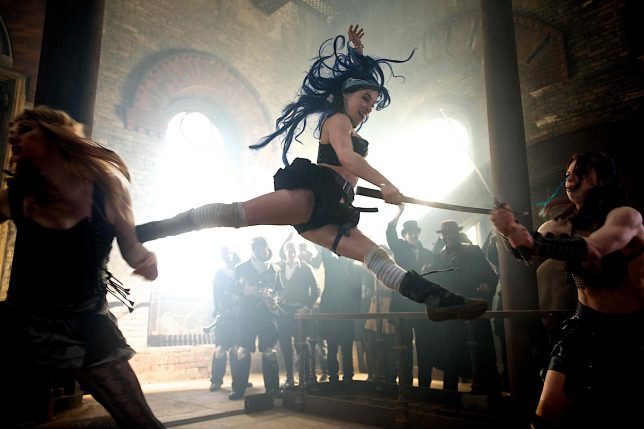 More positively, we have Fay’s acting and directorial talents. The former isn’t much of a surprise, as I enjoyed her performance in
More positively, we have Fay’s acting and directorial talents. The former isn’t much of a surprise, as I enjoyed her performance in 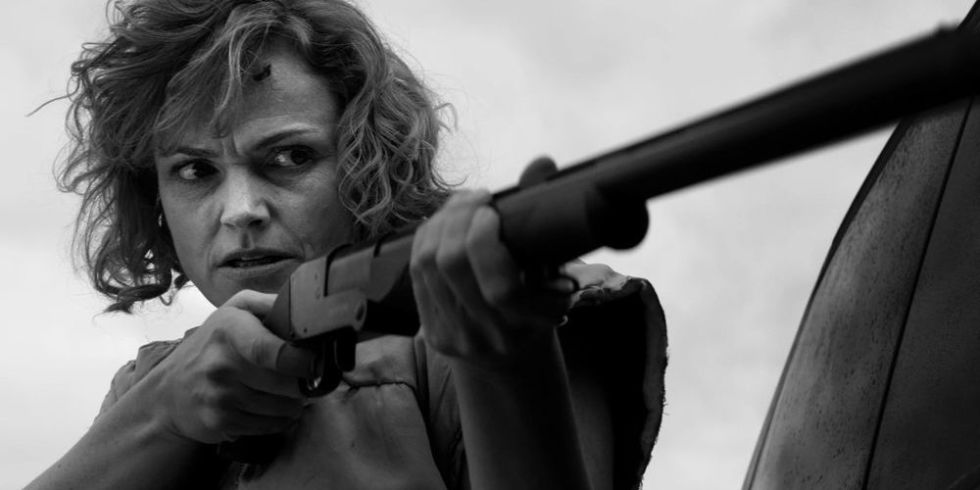 ★★★½
★★★½